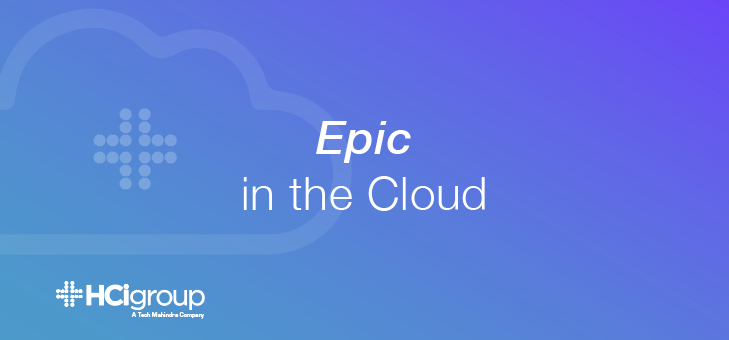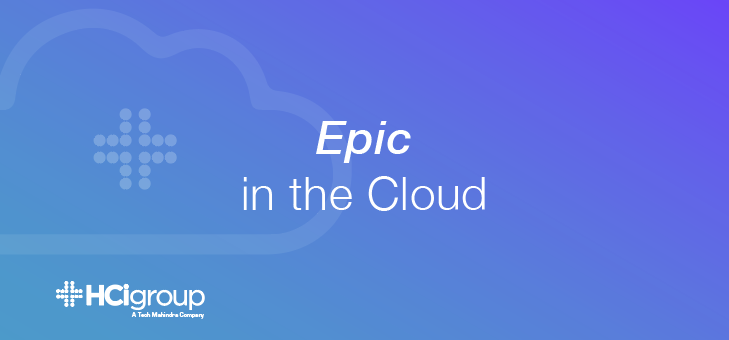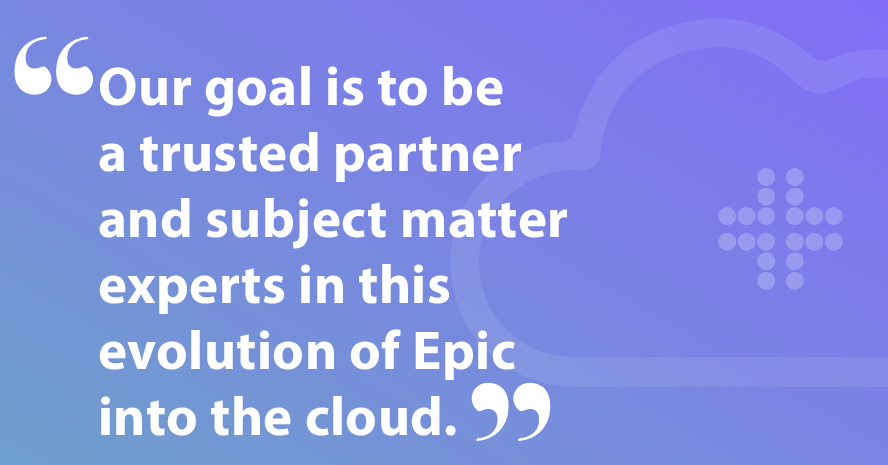Epic in the Cloud


Ken Bradberry, CPHIMS - Senior VP & CTO at The HCI Group explores the future of cloud technologies and how Epic can be integrated into strategic cloud computing services.
In today’s healthcare organizations, cloud services have become a strategic alternative to traditional application delivery. Cloud computing isn’t anything new to IT, and it now has the potential to change how healthcare organizations deliver cost effective, quality driven services to their patients. Considering the ever-increasing costs of keeping the lights on spending for IT, healthcare providers have no choice but to embrace the cloud in some form. This transformation is being driven by several forces, but the most basic are to cut costs and improve the quality of care.

Healthcare providers who currently host their own Epic environment have the challenge of reducing operating costs, avoiding large capital costs to refresh hardware to prepare for Epic upgrades, and future quarterly maintenance requirements. Taking control of the cost of ownership with these large and complex EHR suites can be a constant struggle with conventional architectures. If that isn’t enough, healthcare providers and patients are now more accustomed to the 24/7 continuous availability that they enjoy from online retailers and financial institutions and expect - or even demand - such access and services from their healthcare providers.
What Epic Cloud Services Have to Offer
Healthcare IT organizations need to embrace the best of what cloud services have to offer. We have done extensive research on the use of cloud services in healthcare, specifically hosting Epic systems. There are several criteria required to deliver this service to healthcare organizations. This starts with an evaluation of the current Epic environment that focuses on the current performance and capacity requirements in order to develop cloud architectural design and deployment scenarios that have the potential to provide the following capabilities:
- To deliver 99.999% uptime as a fully redundant Epic platform and DR as a service cloud, managed with around-the-clock monitoring by Epic and infrastructure specialists.
- Development of an Epic certified architecture to provide the highest level of performance and redundancy.
- Improved cloud VM performance, solid state disk technologies and other enabling technologies have better equipped cloud vendors to handle more complex workloads.
- The HCI cloud strategy starts with a consumption-based cloud model that includes Epic Disaster Recover as a Service and non-production systems (test, dev, train) requirements that dramatically reduce the cost of ownership.
 At HCI, we have spent years developing Epic solutions and you can learn a lot managing the care and feeding of these environments. As part of Tech Mahindra, we have merged our Epic expertise with their deep Microsoft Azure acumen to address all of the finer technical requirements, but also the operational aspects of cloud services. All sizing is based on the Epic Hardware Configuration Guide and our experience working with Epic customers. This includes practical experience delivering fault-tolerant, high-availability infrastructure hosted and managed through both conventional Epic hosting designs as well as cloud services providers, like Azure or AWS by transitioning experience across healthcare customers.
At HCI, we have spent years developing Epic solutions and you can learn a lot managing the care and feeding of these environments. As part of Tech Mahindra, we have merged our Epic expertise with their deep Microsoft Azure acumen to address all of the finer technical requirements, but also the operational aspects of cloud services. All sizing is based on the Epic Hardware Configuration Guide and our experience working with Epic customers. This includes practical experience delivering fault-tolerant, high-availability infrastructure hosted and managed through both conventional Epic hosting designs as well as cloud services providers, like Azure or AWS by transitioning experience across healthcare customers.
The HCI Epic Hosting Hybrid Approach
Currently we are taking a hybrid approach to Epic hosting that focuses on DR as a Service in the Azure cloud, much like the model announced by Legacy Health a few weeks ago. Our hybrid approach will provide our customers with digital transformation without risk to performance or production Epic stability. Our goal is to provide healthcare providers with a roadmap starting with proven technology for production, supported by leverage cloud services for DR and non-production hosting. Epic production in the cloud will follow once Epic and cloud services are fully certified for production. In the meantime, we will provide all the benefits of Cloud (financial and operational) with the performance of an on-prem solution with an Azure based DR. Having a strong partnership with Microsoft also helps and this has been instrumental in developing this capability.

Our Epic Cloud Readiness Assessment
To ensure a healthcare organization is cloud ready, we have developed an Epic Cloud Readiness Assessment designed to examine layers of the Epic architecture and the supporting infrastructure. One of our goals is helping healthcare IT prepare for delivering critical application services like Epic in the cloud. It’s important for customers to select service providers that bring a well-established team of experienced and Epic certified professionals. Leveraging experienced IT staff and experts in clinical applications, as well as pre-developed processes, best practices, and lessons learned will enable our customers to avoid a wide range of performance, capacity and operational challenges.
Our goal is to be a trusted partner and subject matter expert in this evolution of Epic into the cloud. Our deep healthcare provider consulting experience will ensure an optimal delivery solution. Our experience in supporting large IT outsourcing engagements across customers with similar needs for high availability and low fault tolerance among healthcare payers, life science, and pharmaceutical companies will provide our customers with best practices, collaboration, and data analytics to ensure quality of services at lower costs.
More on Epic:
- 10 Areas of Focus for Planning Your Epic Upgrade
- 5-Step Epic Optimization Program
- Epic Upgrades: 3 Considerations When Deciding Between a Single or Double Upgrade
